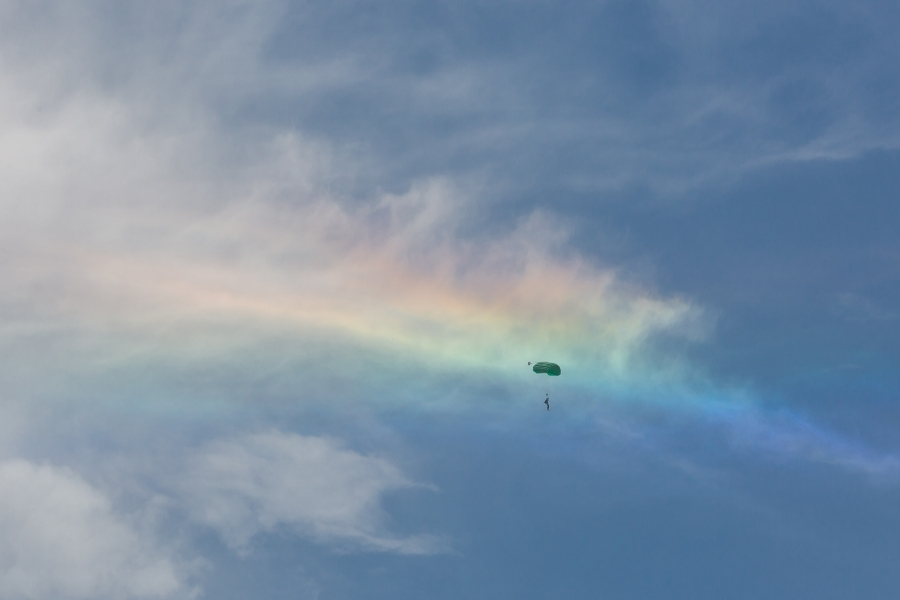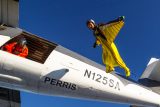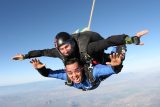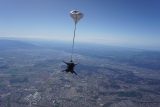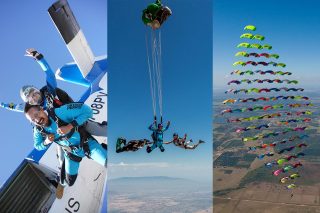The Falling Star Behind the Falling Stars
People Of Perris
Posted by: Skydive Perris
6 years ago
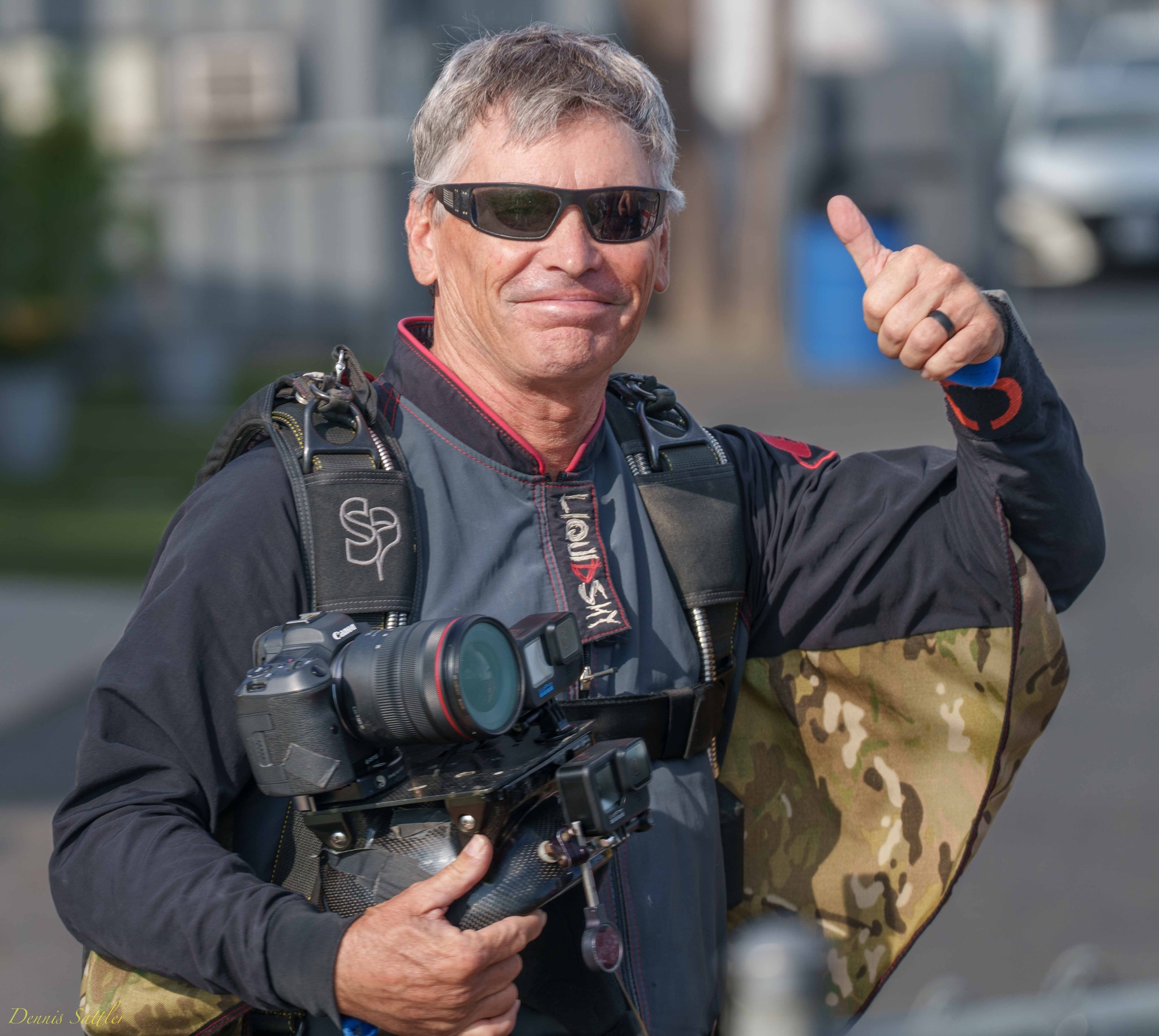
Meet Craig O’Brien, the Man Behind the Blockbusters
To say that Craig O’Brien sits atop the Mount Olympus of camera jumping wouldn’t be any kind of exaggeration: a lofty status well-earned. Twenty-five years into his jumping career, his logbook lists around 24,000 jumps, most of which have been dedicated to committing something to visual posterity.
To be fair, Craig got a running start. Born to a sport skydiving family, Craig grew up on the Taft dropzone. In high school, he cut his teeth as a photographer by shooting his brother’s football games. The plan, naturally, was to start skydiving at age 18. Tragically, fate derailed those plans; a crash, which took 14 skydivers’ lives, closed that dropzone in 1982.
“I couldn’t convince any of my buddies to run off someplace further away to check out skydiving,” Craig remembers. “Then, years later, the Jones family reopened the Taft dropzone. I zoomed out there and got right into it. I just put my two passions together—skydiving and photography—and made a career out of it.”
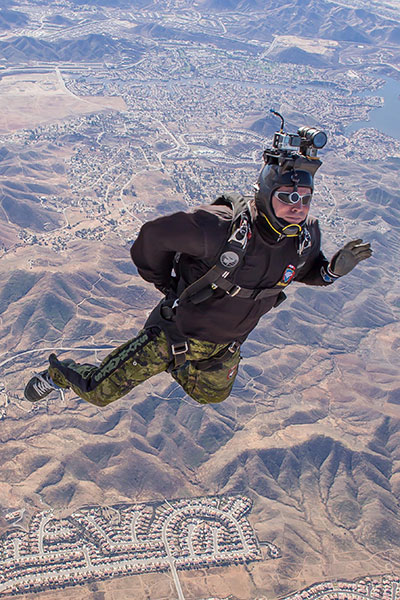
He was 29 at the time, living in Bakersfield, working as an electrician. He made the 40-minute pilgrimage every weekend for about four years, learning everything he could from Taft’s legendary DZO, Bill Jones, and equally eminent aerial photo-cinematographer Joe Jennings, who shot occasional projects at Taft with Bill.
Craig was happy. He made decent money, and he was also starting to train with his then-girlfriend, Tanya, who is now his wife, as a skysurfing team. The talented pair realized they needed to take it on full-time if they really wanted to be competitive, so they picked up and moved down to Perris in 1997. They never left.
“I came with intentions of staying for two years and then heading back to my full-time job,” he laughs, “but with all of the things that go on at Perris, I’m able to support my family.”
“The Conasters [the dropzone owners at Perris] are great people,” he adds. “They treat me and my family as part of their own. They’ve supported us from the get-go. That enabled us to achieve the goals we’ve met together.” (The incredible flying O’Briens are, by the way, 3-time World Champions and 5-time National Champions, if you’re curious.)
Even with all that gold, the most visible role that Craig has had on the skydiving scene has arguably been the work he’s done in the film industry. Owing to Craig’s eminent experience, top-shelf portfolio and convenient location to a footage-hungry Tinseltown—he’s generally the first call for freefall-involving feature films. On his resume: The first Iron Man, Iron Man 3 (for which he received two Taurus stunt awards), Kingsmen, The Bucket List and Point Break.
Craig explains that his illustrious film career began as a natural outgrowth of his competitive career, as Craig’s footage of his extraordinarily skilled and beautiful wife made regular television and film appearances. (Notably, the pair appeared together in the opening sequence of the year-2000 reboot of Charlie’s Angels, as flying stunt doubles for the actors.)
“Primarily I work as an aerial cinematographer,” he says, “but sometimes you have to step up and coordinate the stunts yourself, which I am totally comfortable doing.”
That triple-threat vibe—filming, consulting/training and stunt coordination—put Craig in the hot seat very recently, as a matter of fact. If you haven’t been in an off-grid bunker, there’s very little chance you’ve missed Craig’s latest moment in the limelight: his work with Tom Cruise for the sixth installment of the Mission: Impossible franchise: “Fallout.” (Perris shared that limelight for a very fun day during Tom’s press tour for that film, when we hosted Tom Cruise throwing funnyman James Corden out of one of our planes for James’ first taste of freefall.)
“Those two guys together were quite funny,” Craig says. “We had a great day out at Perris when we did that James Corden show. We were laughing all day long. It was a lot of fun for me. It was a lot of fun hanging out with Tom and meeting James. That James Corden is a funny guy. Tom played really well with him, and the two are a great match of wits.”
That may have been the first time Craig had met James Corden, but he was already a very familiar face to Tom, having worked closely with him to prep the jaw-dropping skydiving scenes of Mission: Impossible 6.
“Tom is laser-focused. There is no deviating from the plan,” Craig muses. “The rest of the world gets put on hold when you are shooting with him, and that’s how I like it. I like to be focused and take care of business. But when you’re done shooting, [Tom] is just the easiest guy to be around and was pleasant to everybody on set. I really enjoyed our time together. I’m hoping we get to do it again.”
The prep for Fallout first involved training in a 24-foot outdoor tunnel, which had been built adjacent to the Warner Brothers stages where the movie was being filmed. For some weeks, Craig and the stunt team would swoop in to snag Tom when he became available to take him out for some tunnel time.
“He is a talented guy,” Craig says. “He picked it up like nothing. He did do 40 to 50 skydives back in the early 90s out at DeLand while they were filming Days of Thunder, but he hadn’t jumped since. He picked up everything really quickly and did really great in the tunnel.”
After London, the training relocated to Abu Dhabi. There, Craig and Tom spent six weeks focusing on nothing but skydiving, five days a week, out of both a Twin Otter and a C-17 military cargo airplane.
“Normally, when we shoot a skydiving sequence for a feature film, we’ll go up and shoot little pieces here and there,” Craig explains. “In post-production, they’ll take all of those little pieces and put them together to make a whole. But the Mission: Impossible franchise really is all about one thing, and that is Tom Cruise’s skills as a stuntman. They design the sequences to highlight those skills, and to make sure it is shot in a manner that the audience knows it’s him doing these stunts.”
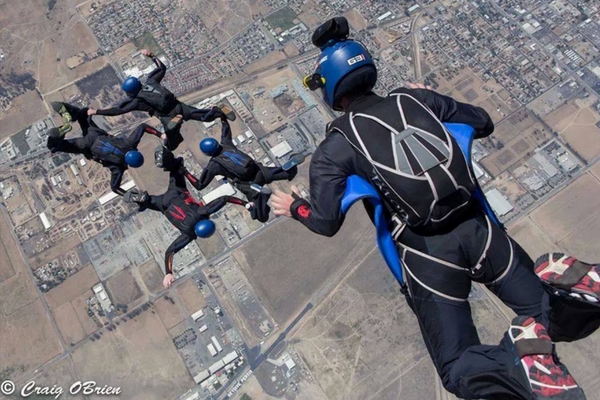
In this case, the sequence was designed to be intentionally long and unbroken, following Tom from the safety of the cargo plane directly out into freefall, with lighting inside the star’s helmet to guarantee the audience sees his face from start to finish. The whole thing clocks in at about three minutes, and in those three minutes there are only two cuts.
That, dear reader, is a tall order.
To pull it off, the team started out by practicing those three sections, over and over again, during daylight hours. Because the sequence is based on a very low-light scenario (A thunder-and-lightning storm, remember?), they started jumping just after sunset after a couple of weeks’ worth of daily training. Once they’d dialed in the details, the pressure was on: Because of the tight constraints on time, the team had only one take per day to get each one-minute shot.
“We repeated that take every evening until we were done before we moved on to the next section of the three,” Craig says. “The first section—the most complicated, actually—we accomplished relatively quickly. When we did that, we thought we were going to wrap this thing up pretty quickly, but section two took us eight tries; in other words, eight days to get a one-minute sequence that was perfect from start to finish.”
“We got close numerous times early on,” he adds, “but [the producers] were very adamant about wanting it to be perfect. I appreciated that. It was a big challenge for me, but it was fun in the end to deliver exactly what they were looking for.”
The “fallout” from Fallout, for Craig, was a hoot.
“On my end,” he laughs, “I had multiple people almost upset that I wasn’t getting enough credit for what I did. I was, like, hey, it’s not about me! It is about him, period. My thanks is a fun time and a paycheck. Then, after the film’s release, [the studio] started releasing more behind-the-scenes stuff of me shooting Tom, and a lot of comments from Tom and the director praising me for what I did. It was quite pleasing for me to hear those guys on the back end, singing my praises.”
It’s hardly surprising that new-to-the-game stunt performers often seek Craig’s advice and mentorship.
“It’s always funny when you get to work with people who are new to production,” Craig grins, “regardless if they’re a young skydiver or an experienced skydiver. Everybody who jumps watches this stuff on TV and in the films. Most people end up being a Monday morning quarterback, but they don’t realize the challenge that’s waiting for us when we go into these things.”
The reality, as it turns out, often catches new stunt performers decidedly off-guard.
“When we’re getting ready to jump, I always tell my jumpers—no matter how quote-unquote-easy the jump looks—it’s never easy when you start filming production. It is never easy. The minute you start thinking it’s easy is the minute you’re going to screw it up, without question. It happens every time. They always start out by saying, ‘Awesome! This is going to be easy.’ I say, wait a minute. They say, ‘No, I got this!’ Then they do the jump and land…and what happened to ‘I got this?’”
“It’s really about attention to detail,” he adds. “The bottom line is, as skydivers when we’re being hired for a production, it is not our job to be the director. It is our job to deliver the director’s vision, which is where, I think, a lot of people fall short. Productions will show up, and they might have the cheesiest script in the world, but they’re paying us to deliver that cheesy script. It’s not our job to direct their production. So many people get in trouble—and earn a bad name for skydivers—because they try to step up and be the director on set, which is not our job. Our job is to deliver, period.”
These days, Craig spends his days between jobs hanging out with Tanya and their two daughters: Delaney, 16, and Leah, 12.
“I feel super blessed to be able to do what I do,” Craig smiles. “I’m not getting rich doing it; the big jobs are few and far between, but I’m still the sole provider for my family, doing what I love to: Keep a smile on my face and enjoy the ride.”
